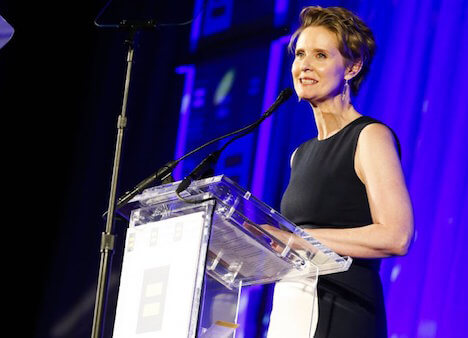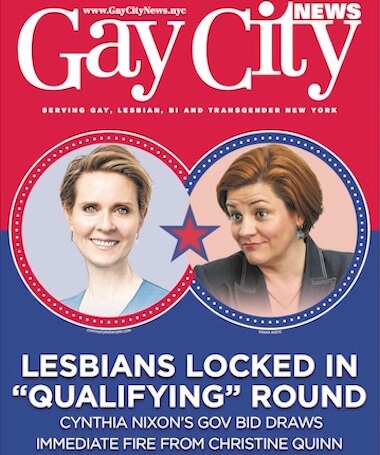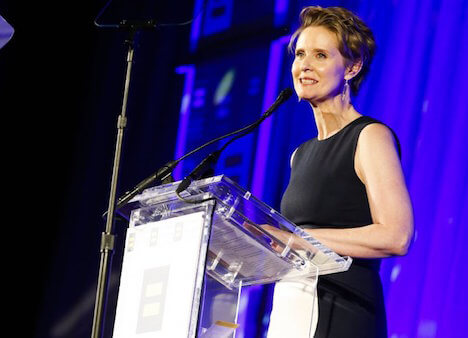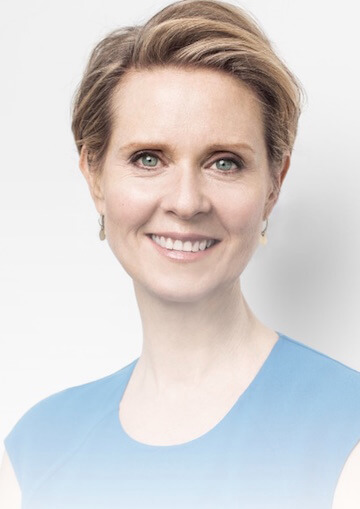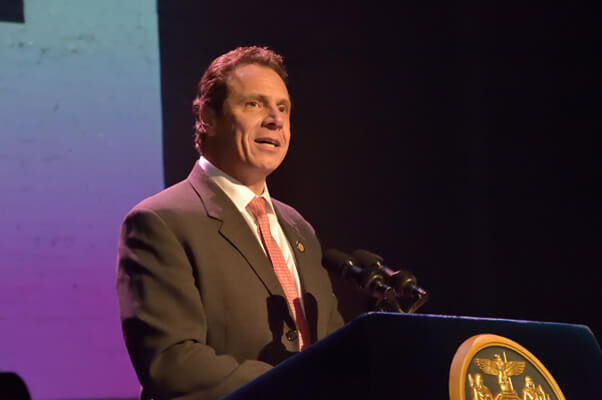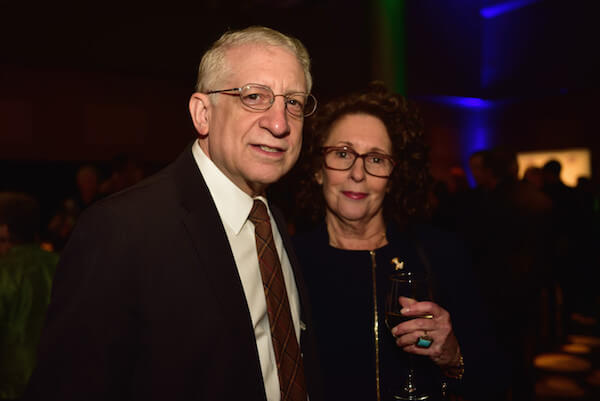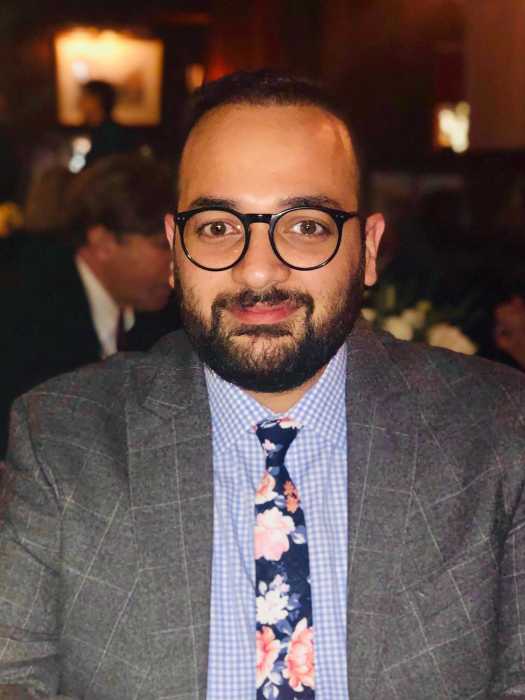PHOTOS: CYNTHIAFORNEWYORK.COM (NIXON); DONNA ACETO (QUINN)/ DESIGN BY MARCOS RAMOS
Even among the 40 percent of New York State voters who say they know who Cynthia Nixon is, much of that recognition comes from her long-running role as Miranda Hobbes in the “Sex and the City” TV and film franchise. Theater aficionados will be familiar with her substantial body of work on stage, which has earned her two Tony Awards. She’s even won a Grammy for the album issued in tandem with Al Gore’s “An Inconvenient Truth.”
But Nixon is no slouch when it comes to public affairs. For more than a decade and a half, she was a spokesperson for the Alliance for Quality Education, a teachers’ union-backed effort to organize parents to advocate for public schools. She was active in the marriage equality fight and has represented Planned Parenthood in Albany, spoken out about surviving breast cancer, and been a ubiquitous presence at local resistance demonstrations since Donald Trump’s election.
But perhaps her highest profile politically — at least until this month — was her enthusiastic support of Mayor Bill de Blasio, both in 2013 and last year. Five years ago, when her candidate was still struggling at the back of the Democratic pack, lagging behind front-runner Christine Quinn — who would have been the city’s first out LGBTQ mayor — Nixon, who has variously described herself as bisexual and lesbian, headlined LGBT for BdB, a raucous Cutting Room campaign event featuring an impressive array of stage actors and downtown nightlife personalities. She reprised her emcee duties at LGBT for BdB II this past August.
Cynthia Nixon’s gubernatorial bid draws immediate fire from Christine Quinn
No political figure in New York has been a bigger thorn in the side of Nixon’s mayor, of course, than Andrew Cuomo. They’ve battled over funding de Blasio’s signature pre-K program and the city’s ailing subway system as well as the mayor’s hopes to extract greater tax revenues from New York’s wealthiest. No mere political disagreements, these battles have featured nasty personal snubs and brazen bureaucratic maneuvers.
So it’s not surprising that Nixon harbors antipathy toward Cuomo, regarding both his priorities and his style. For months, there was widespread speculation, dismissed initially but over time taken more seriously, that she would take on the incumbent even with his $30 million war chest. One would expect the governor’s allies to be prepared for the moment on March 19 when Nixon made it official.
That would seem, however, not to have been the case with Christine Quinn, who during her eight years as City Council speaker was rarely at a loss for the well-crafted sound bite, whatever the question posed. In what can at best be described as an unfortunate interview with the New York Post one day after Nixon took the leap, Quinn said, “Cynthia Nixon was opposed to having a qualified lesbian become mayor of New York City. Now she wants an unqualified lesbian to be the governor of New York.”
That an ally of Cuomo would go after a challenger for, in Quinn’s words, never having “run an organization,” is hardly surprising. But Quinn’s decision to distinguish “qualified” and “unqualified” lesbians betrayed an undiminished resentment over Nixon’s support for her 2013 rival and made her the butt of untold numbers of social media posts. In a series of Twitter posts and in several TV interviews, Quinn tried to backpedal, but the phrase will no doubt stick to her — at least through the primary campaign, making her utility to Cuomo nil. The governor, for whom she worked for a time as a special advisor and who no doubt blessed her appointment as a state party vice chair, must certainly have hoped for a better assist from Quinn in the event the primary becomes a horse race.
Nixon responded substantively by telling reporters, “My being a lesbian or her being a lesbian I think has nothing to do with why we’re running for office.” But she also understood the PR opportunity Quinn’s slam unintentionally handed her. On Twitter, she posted, “When I announced yesterday that I’m running for gov, one of Cuomo’s top surrogates dismissed me as an ‘unqualified lesbian.’ It’s true that I never received my certificate from the Department of Lesbian Affairs, though in my defense there’s a lot of paperwork required.” It would be surprising if Nixon hasn’t raised money from the contretemps.
Cynthia Nixon accepting the Visibility Award at the Human Rights Campaign’s 2018 Greater New York dinner in February. | COURTESY OF HRC
If comparisons are to be made, an effective introductory video followed by a fiery speech in Albany put Nixon in good stead when placed side by side with a serious misstep by a political pro. Ken Sherrill, an out gay professor emeritus of political science at Hunter College, lauded Nixon’s campaign launch, saying he is struck by “how much more polished she was as a candidate than Zephyr Teachout,” the Fordham law professor who four years ago challenged Cuomo from the left and captured 34 percent in the primary.
In Sherrill’s view, Cuomo has few substantive achievements to tout from his second term, in part because he has co-signed Republican-Independent Democratic Conference control of the State Senate in order to maximize his own power by having a divided Legislature. That power, however, is largely the power to block things — more state spending, higher taxes, and wealth redistribution — according to Sherrill. Nixon has focused considerable attention on failing schools, a crumbling subway system, and income inequality hobbling upstate communities — all issues that require spending. Cuomo’s tightfistedness, he suggested, is where Nixon’s message “can resonate.” Pointing to Cuomo’s leadership on marriage equality in 2011, Sherrill noted that most of his “progressive” achievements have been on issues that didn’t involve spending money.
Nixon’s challenge — against long odds, Sherrill acknowledged — is to show voters she’s done her homework on a broad range of issues so that they “can have real confidence in her.” Cuomo, if he begins to feel the heat, will likely try to show up her relative ignorance about how the state operates.
“Can she be successful running on a wave of discontent,” especially against an incumbent “who virtually never comes over as pleasant?,” Sherrill asked. “Maybe. Can she be credible? Perhaps.”
As for Quinn’s swipe at Nixon, Sherrill said, “She was like an aging shortstop who’s lost a couple of steps to the left. She was not in campaign shape. She just didn’t get the sentence structure right.”
George Arzt, who owns a communications and lobbying firm long active in city politics, agreed that Nixon will likely give Cuomo a tougher challenge than Teachout did. “But the governor should win, and should win easily,” he added.
Nixon’s strength, he said, is the anger on the left — aimed primarily at Donald Trump, but also diffuse enough that it could hurt any incumbent. “When you’re in for a long time, people can be fickle and may want a change,” he said.
But Trump, in fact, may be Cuomo’s best argument against Nixon, Arzt said, noting the governor could argue, “You have a novice in Washington, and look at what a mess he’s made of the nation, if not the world, in terms of destabilizing it. You need an experienced hand to defend our values.” Comparisons between Trump and Nixon, in fact, were voiced by a number of progressives on social media who rejected her as a “celebrity candidate.”
In contrast to Sherrill and Arzt, Mitchell Moss, an urban policy and planning professor at NYU, wasn’t much willing to credit Nixon’s candidacy at all. “I believe that government requires some level of knowledge and experience that is not found on the Broadway stage or the TV screen or the wrestling ring,” he said. “The problem we have is that we don’t know enough about Cynthia Nixon and what we know about her is not relevant.”
Then, adding a comment he predicted would raise hackles, Moss said, “I have found that when an actor is no longer able to compete on the stage, they somehow think they can translate their name recognition to the ballot box. I think that we should learn from Donald Trump that name recognition doesn’t translate to being able to do the job.”
Nixon’s best shot, he said, comes in the ever-declining number of voters who participate in primaries. An energized left could possibly spell a major upset, but in a general election, Moss predicted, Nixon “cannot win statewide.”

